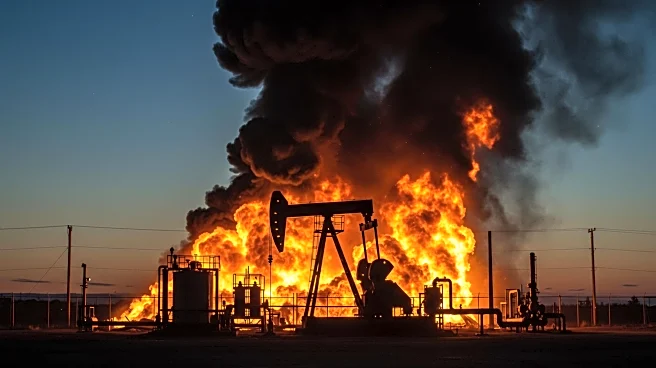What's Happening?
Ukraine has conducted a drone strike on Russia's Unecha oil pumping station, part of the Druzhba pipeline system, causing a significant fire. The operation was carried out by Ukraine's Defense Intelligence Directorate in collaboration with other defense units. The facility, located in Russia's Bryansk region near the Ukrainian border, plays a crucial role in supplying fuel to Russia's military-industrial complex. The strike is part of Ukraine's strategy to undermine Russia's logistics and energy infrastructure amidst ongoing conflict.
Why It's Important?
The strike on the Unecha oil pumping station represents a strategic move by Ukraine to disrupt Russia's energy supply chain, impacting its military capabilities. The operation highlights Ukraine's use of drone technology in warfare, reflecting broader trends in modern military tactics. The attack may escalate tensions between Russia and Ukraine, influencing diplomatic relations and international perceptions of the conflict. The disruption of energy infrastructure has economic implications, potentially affecting global oil markets and supply chains.
What's Next?
The strike may prompt retaliatory actions from Russia, potentially escalating military engagements in the region. Ukraine's continued targeting of strategic infrastructure suggests a focus on weakening Russia's military capabilities. The situation may influence diplomatic negotiations, with potential impacts on international support for Ukraine. The broader geopolitical dynamics of the conflict could affect global energy markets and economic stability. The use of drone technology in warfare may lead to further advancements and strategic shifts in military operations.
Beyond the Headlines
The ethical implications of targeting energy infrastructure are significant, raising questions about the impact on civilian populations and environmental consequences. The use of drone technology in warfare reflects broader trends in military innovation and the changing nature of conflict. The strike highlights the complexities of international law and the challenges of balancing military objectives with humanitarian considerations. The geopolitical dynamics of the conflict may influence global perceptions of U.S. foreign policy and its role in mediating international conflicts.










